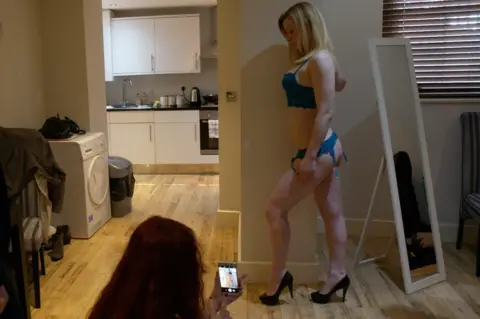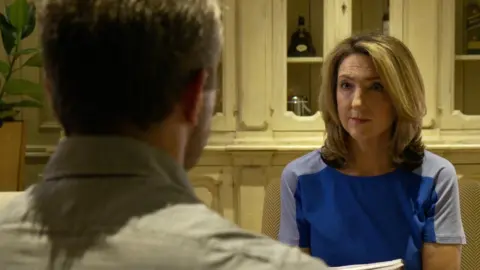The brothel operating 'in full view of police'
Police are choosing to allow brothels to operate providing they create a safe environment for women, one former detective - now a brothel owner - has told the BBC's Victoria Derbyshire programme. We have been to meet the women working in his premises.
The small, smart two-bedroom flat in a Victorian residential block could not be further from what you might expect of a brothel.
Many across the UK use trafficked or drug-addicted women who are controlled by pimps, but this is different.
The interior of the central London apartment is modern, pleasant and warm - there are no grubby net curtains at the windows, or threadbare sheets on the beds.
Sitting on the brown, faux-leather sofa in the living room is "Cherub", from Romania, in a dark red bra and knickers, and nude patent heels from Primark.
Next to her is "Janine", wearing a short black satin robe over purple underwear.
Both are cautiously friendly.
'Moral judgements'
One of the women, however, is happy to open up about all aspects of her work, and be pictured.
Louise is British, has a diploma in marine biology and £20,000 of student debt.
She says she would rather work three or four days a week selling sex, with the earning potential of up to £900 a week, than "12-hour days in a petrol station on the minimum wage".
She is also keen to challenge the stigma around sex work.
For her it is a choice, she says, and she is not being exploited.
'I'm stubbornly defiant about my right to do this kind of work without people inflicting their moral judgements on me," she says.
"I don't want people to think I'm on drugs or that I've been forced or coerced or trafficked.
"I'm just here as a normal person who wants to make money, secure a future for myself and do this kind of work because I choose to."

The conversation is punctuated every 10 minutes by the phone or front door bell ringing - a man making a booking or arriving for his "appointment".
Clients are charged £70 for each half hour. Of that, the women take £45 and £25 goes to the brothel. A busy day for Louise would involve eight or nine clients.
We spoke to 11 women and members of staff at the brothel, who all told us they were working there by choice, and not under the control of anyone else.
We were not allowed to speak to any of the clients and none of them knew we were there.
No-one could say if the neighbours were aware of what went on in the flat.
'Handsome gentlemen'
One of the maids - or receptionists - who has been in the industry for more than two decades, says the profile of customers has changed during that time.
"There are a lot of younger gentlemen coming in, handsome gentlemen - people that you wouldn't think would need to pay for sex, but it's easier for them than dating," she says.
"Sometimes friends will come together before a night out. It's become a lot more normalised."
Double doors lead from the living room to a small hall, off which there are two bedrooms (one en suite) and a tiny bathroom.
They look like mid-range hotel rooms - cream walls, dark grey bedding dressed with a couple of silk cushions.
Either side of the double bed is a wooden chest of drawers containing multiple packets of baby wipes, and nappy sacks for used condoms.
A well-thumbed copy of Men's Health magazine sits next to the bed.
Between clients, the women sit around drinking tea, scrolling through their phones, and laughing about a customer who had wanted Janine to pretend she had "dumped him".
Astonishingly, the 45-year-old brothel owner, Karl, is a former police officer.
The father-of-one says he has been in the role for 15 years. His teenage daughter doesn't know about his job.
Despite it being illegal to operate a brothel in England and Wales - although not illegal to buy and sell sex - Karl says he has no moral qualms about breaking the law because he does not agree with it, and he says he is not exploiting the women who work for him.
"We don't allow drugs, no under-age girls. We check everyone's passports," he says.
"If we've got any doubts that they're not there under their own free will, we will call the police."
'I could go to prison'
Karl - whose surname we are not using - says he has done that twice in the past decade and a half.
He says he operates the brothel in full knowledge of the authorities, and claims they are willing to let him continue as long as the women are in a safe environment.
"If they close us down, I could go to prison," he acknowledges.
"But then there's 15 to 20 girls who've got to find somewhere to work."
The National Police Chiefs' Council (NPCC) lead for prostitution and sex working, Assistant Chief Constable Dan Vajzovic, says: "Officers will now consider a range of factors, including the safety of those sex workers involved, before deciding on whether prosecution is the most appropriate response to an offence.
"Enforcement alone has proven to be an inadequate response to prostitution."
He says it remains a priority to "crack down on those who use their position to exploit the vulnerable".

While Karl and Louise argue for legalisation, feminist Julie Bindel who has written a book on the trade, said legalised brothels were actually worse.
She interviewed 100 women who worked in prostitution during her research.
"It's a fantasy that legalisation would help anyone except the pimps," she said.
"Even the women who choose to, they exist, they are doing it to make ends meet. And we can't keep accepting and condoning it, the buying and selling of the inside of women's bodies."
Both Karl and Louise say they pay tax on their earnings.
Karl and his wife have a limited company, registered as an escort agency.
He says his yearly salary pre-tax was £60,000.
Louise agrees with Karl that brothels should be legalised.
"If I'm on my own [and not in a brothel] - which is what the law allows me to do - I'm at the mercy of whichever client decides to come in," she says.
"A client can come in, rape me, beat me, mug me.
"[But] if I work in a brothel where there's other women present, where there's a receptionist, it's a million times safer."
Watch the BBC's Victoria Derbyshire programme on weekdays between 09:00 and 11:00 on BBC Two and the BBC News channel.
